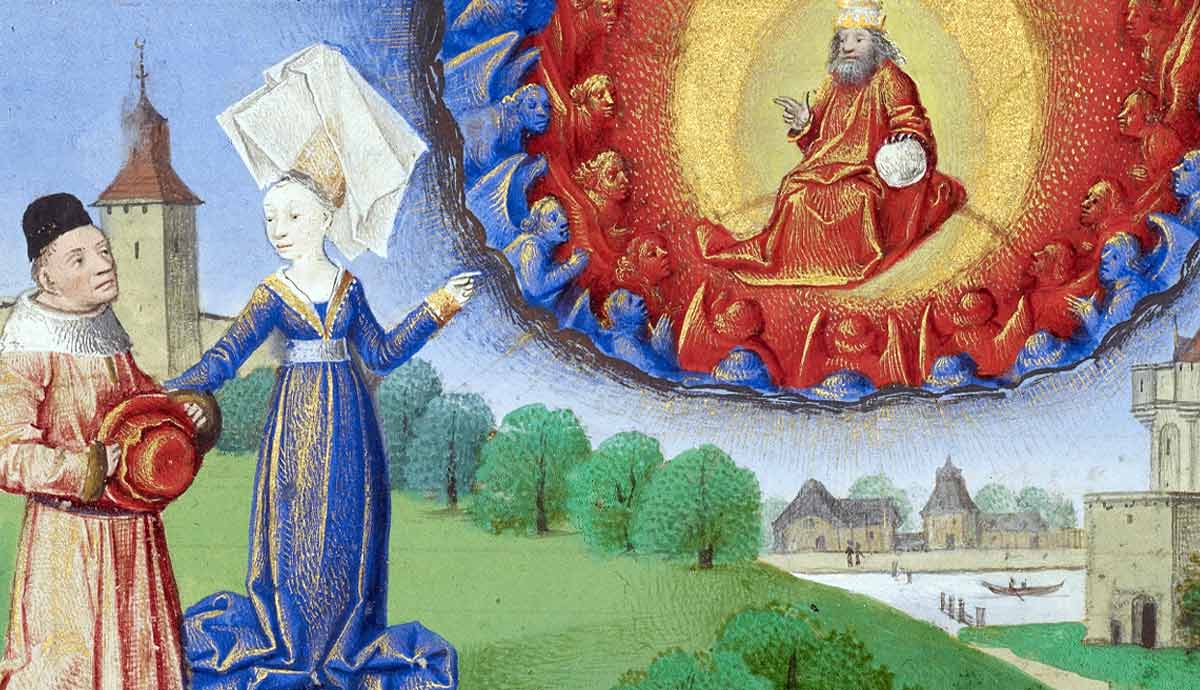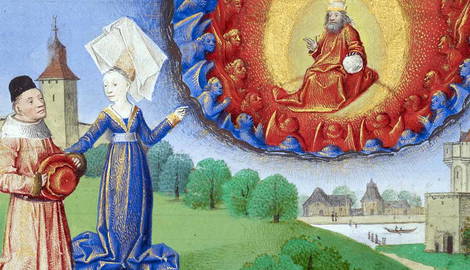
Boethius, a Roman philosopher facing imminent death, penned The Consolation of Philosophy during his imprisonment amidst Roman decline and Christian zeal. In this seminal work, he dialogues with Lady Philosophy, finding solace in her counsel amid existential turmoil. Their conversations on fate, free will, and divine providence reverberate through theology and philosophy, bridging classical and Christian thought. Despite his tragic fate, Boethius’s enduring legacy illuminates the human quest for understanding amidst life’s uncertainties.
Boethius at the End of His Life

Imagine being imprisoned on suspicion of treason in a tower during a time in which you are surrounded by ruthless Roman soldiers fighting with all their might to hang on to a once-glorious and now-eroding empire and newly vehemently zealous Christians—is there any hope for avoiding torture?
Not for Ancius Manlius Severinus Boethius. Likely to have been fastened with a cord around his neck that would be tightened to make his eyes bulge and ultimately beaten to death with clubs, was there any hope to find some consolation on this tortuous period of the end of his life? It seems he may have, or at least one would hope.
He captured this in what he wrote during this time, which was widely popular for hundreds of years thereafter, titled The Consolation of Philosophy. Today, however, it is not widely read, but arguably, much can still be learned from this work.
Some Biography of Boethius

Roman Philosopher Ancius Manlius Severinus Boethius lived from 417 to 525 CE, so his life ended about two decades after the fall of Rome when the last emperor was deposed, which thus was already in decline. In his life, and typical to the human condition, he experienced highs and lows, which can also be interpreted at times as simply moments of good luck or moments of bad luck, respectively.
During his adult life, he gained wealth, and his family prospered. In his spare time, he studied philosophy. He was an avid reader and translator of the Ancient Greeks, Plato and Aristotle. He was also a Christian, so he truly represents the historical and philosophical shift from the dominance of Roman to Christian ideas.
One of the best professional positions Boethius held was as Consul under Theodoric the Great, the ruler of Rome during the time. The interests of the Gothic King Theodoric also exemplify the historical context of attempts to bridge the transition from the period of Roman dominance to that of the Judeo-Christian perspective, as central in Boethius’s role as Master of Offices was to help smooth relations with the Romans. However, it was under Theodoric that his life would come to an end after being sent to prison on charges of treason, despite always pleading his innocence, and he was eventually put to death.
The Arrival of Lady Philosophy

In The Consolation of Philosophy, written during his time in prison, he concurrently writes that he is visited there by Lady Philosophy, who has come to save him from self-pity and offer him the consolation that will alleviate all his suffering. Her advice is also very much representative of this bridge between the Roman and Medieval periods, as she provides him with advice from both a philosophical and religious perspective.
She reminds Boethius that humans do have free will despite his confusion over what he sees as a paradox: how can we have free will if God knows everything we do? In a vein similar to Stoicism, Lady Philosophy reminds Boethius that we are in control of our attitudes, and so we have free choice when it comes to decisions about what we do and how we react to things. God does not understand time in the way we mortal humans do; God sees all at once. Still, we are ultimately agents in charge of our inner lives.
The Consolations of Lady Philosophy

As has long been argued by many philosophers, and undeniably to most, the most important goal in life is happiness. Again, akin to Stoic philosophy, as the world outside of ourselves is not within our control, we should focus on what we can control, which is our inner world. Thus, happiness can only come from within as well since that is what we can control.
Humans get lost when they forget this and struggle to find happiness from outside themselves in the uncontrollable. In combination with his Judeo-Chrisitan views on the afterlife, it is that inner soul also that will live on; everything in this world will not, so really, they are just insignificant and not sources of happiness.
When we pass away, our material goods do not come with us; we are only left with our souls. This is important for someone who is locked up in prison to remember because these are all the things that have precisely been taken away. There is one ultimate greatest good of all: God. This is the main consolation offered—have faith in God, as that is where he will find true happiness.
God Sees Our Suffering

This is like Plato’s philosophy on the world of the Forms and the Good, which is the ultimate Form but which can only be known upon the soul’s transmigration when it visits the world of the Forms. Lady Philosophy reminds Boethius that God judges the free will that we all have, and the choices that lead us to make, so choose wisely and keep the faith.
Lady Philosophy tells Boethius not to worry: God and thus the good will be victorious. And we are free, and that is what gives us the ability to control what we experience inside our minds so that we may find a way to endure suffering, as he was experiencing. She also reminds him that he is not alone—in history, there have been many who suffered unjustifiably.
In a vein similar to the Socratic ethics outlined by Plato, a good person cannot really be harmed. But, with faith in God, we can rest assured that injustice will not go unnoticed, and evil will not ever ultimately triumph. Moreover, again we must remember, Lady Philosophy urges, that because God sees all in a timeless manner, there is a reason, though it may be hidden from us, why bad happens in the world—and since God knows, it must ultimately be a good reason.
This kind of knowledge is perfect and complete, the kind that only the supreme source of all, God, has. While there is a central emphasis on the role of God in this discussion with Lady Philosophy, there is no material that is very clearly distinctly “Christian” in this work. The figure of Lady Philosophy is pagan.
Boethius & the Paradox of Free Will

This discussion in The Consolations of Philosophy was to have wide reverberations in theology and philosophical reflections on religion, as many subsequently worked to continue questioning the meanings of fate, free will, God’s providence, and how they all might or might not be related.
Lady Philosophy tells Boethius that chance is different from free will and that because God exists in a kind of timeless manner and not at all in the way human beings experience time, humans can still have freedom of choice. This is important because, without freedom of choice, there is no moral responsibility. And without moral responsibility, one is led to question how the evil will be judged—something important indeed for a man steadfastly claiming innocence upon his death sentence.
These topics are still debated, but either way, one would hope that Boethius was at least able to endure the torture he experienced at the end of his life. One would hope he did find some consolation, even if it was just to a small degree. It was a reminder that we mortal humans can receive some illumination and some knowledge, though we must always remember our place as never being able to achieve this in entirety. He was considered a martyr by many, some even calling him St. Severinus.
What cannot be debated was the imprint he left in adding to the quandaries proposed in the long conversation, which is the history of philosophy. It was widely read during the Middle Ages, inspiring people to be hopeful and faithful. He was an important bridge between classical philosophy and Christianity during a tumultuous period when such a gap was hard to cover.










